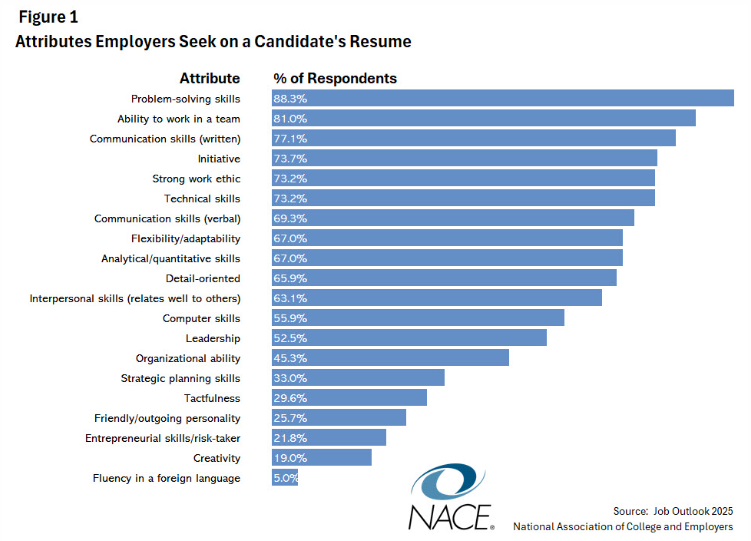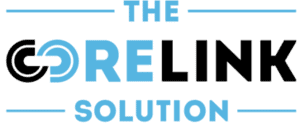9 Skills Employers Look For: Your Pathway To Success
Have you wondered what skills employers look for nowadays?
Graduation marks a significant turning point—you’re ready to show the world what you’ve learned. But a degree doesn’t always equal getting hired.
What will you do?
Do you have what it takes to beat out the competition? Are your internships and networks enough to get you an interview?
According to NACE’s Job Outlook 2025 survey, nearly 64.8% of employers use skills-based hiring practices for new entry-level hires.
With the rise of skill-based hiring, where employers prioritize specific skills over general qualifications and upskilling—learning new skills to complement your college education can improve your job prospect and give you a solid foundation for success!
Let’s take a look at the skills employers will be looking for this year, so you can land the job you want the first time.
Let’s go!
Why Skills Matter to Employers
Employers seek more than just a list of qualifications—they seek skills to help create a smooth, productive work environment. These skills can often be obtained through academic learning and hands-on experience. However, hands-on experience shows promise because it demonstrates the level of comprehension, critical thinking skills, and initiative you’ve developed. Employers value effectiveness, and the skills covered in NACE’s guide are key to showing your effectiveness in the workplace.

What Do Your Skills Say About You?
Your skills tell employers about your ability to work with others, your communication style, and personality. Skills reflect your cognitive ability, motivation, and willingness to adapt and overcome challenges. Employers highly value these qualities because they indicate that you can contribute to a positive, effective work environment.
You still have skills even if you haven’t had a job before. Think about what you’ve learned in class, how you’ve managed your time, or how you’ve tackled problems. These are all skills that employers are looking for. As you go through this list, think of ways you can take your college experience, to highlight the skills you already possess.
9 Skills Employers Look For
1.Critical Thinking and Problem Solving
Employers want candidates who can analyze situations and come up with practical solutions. This skill tops the list because this it’s needed in almost every job. Its a habit we form everyday when problem solving and active learning is a sure way to improve it.
2.Teamwork and Collaboration
Working well with others, especially in diverse teams, is crucial in today’s workplace.Good teamwork structures provide your organization with a diversity of thought, creativity, perspectives, opportunities, and problem-solving approaches.Teamwork will help people feel more satisfied and encourage friendship and respect.
3.Professionalism and Strong Work Ethics
Employers appreciate employees who demonstrate reliability, punctuality, and task dedication. This assure your employer that you are able to work and handle tasks independently, in a team, and will uphold honesty and integrity in all tasks. Consistency and accountability is another factor employers need, as things like mistakes and external factors are bound to happen in the workplace.
4.Oral and Written Communication Skills
Strong communication is essential in every job, whether speaking in meetings or drafting emails. Being able to present ideas clearly, confidently engage with colleagues and clients, and writing with proper tone and grammar are skills employers find it’s effectiveness and productive benefits another critical aspect of smoothly operating their business.
5.Leadership
Even if you’re not in a leadership role yet, showing initiative and the ability to motivate others will make you stand out. Having the ability to motivate others to reach shared goals and increase morale makes you invaluable to an organization. Students who have participated in team sports, led activities or after school programs won’t have a problem showcasing leadership.
6.Technical Skills
Proficiency with industry-specific software, programming languages, or hardware can significantly set a candidate apart in today’s competitive job market. Employers value graduates who can seamlessly integrate into their workflows using tools relevant to their field. Demonstrating these skills shows technical aptitude and a readiness to contribute and will leave a lasting impression on potential employers.
7.Adaptability and Flexibility
Employers seek individuals who can adjust to shifting priorities, embrace new challenges, and remain productive under changing circumstances, learning new skills quickly, and tackling unexpected problems with a positive mindset. By showcasing these qualities through examples of navigating transitions or overcoming challenges, graduates can position themselves as resilient and resourceful professionals ready to succeed in any workplace.
8.Interpersonal Skills
Connecting with others, resolving conflicts, and maintaining positive relationships is key. Strong interpersonal skills foster trust, reduce conflicts, and ensure that projects run smoothly. These skills include empathy, teamwork, and the ability to adapt communication styles based on the audience. Demonstrating strong interpersonal abilities shows that you can contribute positively to a team and build meaningful professional connections.
9.Analytical and Quantitative Skills
Data-driven decision-making and analyzing complex situations are invaluable in many roles. Collecting and interpreting information, identifying patterns, and drawing meaningful conclusions to improve processes or drive results. Proficiency in tools like Excel, data visualization software, or statistical programming languages like R or Python can enhance these abilities. Employers look for candidates who approach complex problems methodically, break them into manageable parts, and propose data-driven solutions. Highlighting experiences such as analyzing trends in coursework or internships can demonstrate these critical skills to potential employers.

New Classifications of Skills In-Demand
In addition to these nine, there are specific skills that are in demand in today’s workplace. If you have the ability to prove you’ve mastered these skills through course work or training certificates, make sure you include them in your next job application.
AI (Artificial Intelligence)
AI and Machine Learning (ML) skills will make your resume stand out. With 77% of businesses using or exploring AI and over 50% of companies planning to incorporate AI, demand for these skills is on the rise. AI benefits industries by increasing efficiency, productivity, and data-driven decision-making. If you have experience with AI, be sure to highlight it.
Digital Fluency and Technology Aptitude
Digital literacy includes everything from basic computer skills to advanced software proficiency. Digital fluency furthers your understanding of how technology impacts business processes. If you’re comfortable with digital tools and platforms, this will give you a competitive edge by demonstrating your ability to adapt to new technologies and enhance productivity.
Data and Analytics
Employers value candidates who can interpret and make decisions based on data. Familiarity with tools like Excel, Google Analytics, or data visualization platforms is a substantial addition to your resume. Employers need those who can extract meaningful insights to inform strategic choices. Having experience reading and understanding data, presenting data in readable formats, forecasting trends, or using data to inform decisions and processes is highly sought after.
Remote Collaboration Skills
As remote work continues to grow, proficiency in tools like Zoom, Slack, and Trello is crucial. Demonstrating your ability to collaborate effectively in virtual settings will set you apart from other candidates and emphasize your digital fluency. Most jobs want candidates with good organizational and time management skills, which contribute to being an effective remote worker.
Tips for Tailoring Your Resume and Cover Letter
- Use Action Verbs: Make your accomplishments stand out in your resume and cover letter by using strong action verbs that demonstrate your active role in achieving results. Words like “managed,” “led,” “developed,” “streamlined,” or “spearheaded” help convey your initiative and responsibility. These verbs clearly show your contributions and suggest that you’re results-driven and capable of driving change.
- Match Keywords: Carefully tailor your resume to align with the job description. Identify key skills, qualifications, and industry-specific terms listed by the employer, and incorporate these keywords into your resume and cover letter. Many companies use applicant tracking systems (ATS) to screen resumes, and using the right keywords can increase your chances of getting noticed. Highlight relevant technical skills, certifications, and specific experience that mirror what the employer is looking for.
- Quantify Your Achievements: Numbers provide concrete evidence of your impact and can help your resume stand out. Whenever possible, quantify your successes to show how you’ve contributed to past organizations. For example, instead of just saying “improved sales,” you could write “Increased sales by 20% over the last quarter through targeted marketing strategies.” Specific metrics, like percentages, dollars saved, or team growth, make your achievements measurable and show potential employers the tangible benefits you can bring to their organization.
Prepare For What’s Ahead
Your skills are your superpower. You bring yourself one step closer to landing your dream job by showcasing them effectively in your resume and cover letter. Don’t hesitate to think outside the box and highlight the unique combination of qualities that make you an ideal candidate. Now that you understand the importance of skills and how they impact employers, your colleagues, and yourself, you can fine-tune your abilities, improve them, and present them confidently.
No longer should you feel overwhelmed when preparing your resume or starting your job search. Keep in mind to keep yourself up-to-date with upskilling opportunities to increase job stability. With a clear understanding of which skills are in demand, which ones to improve, and the fast-emerging qualifications on the rise, you’re empowered to take the next step. Instead of charging ahead blindly, you are now informed and ready to prepare effectively—not just for today but for the future.
If this article has inspired you, please subscribe to our newsletter to be alerted when the next piece is released. You can also support the continued creation of this content by making a tax-deductible donation.




